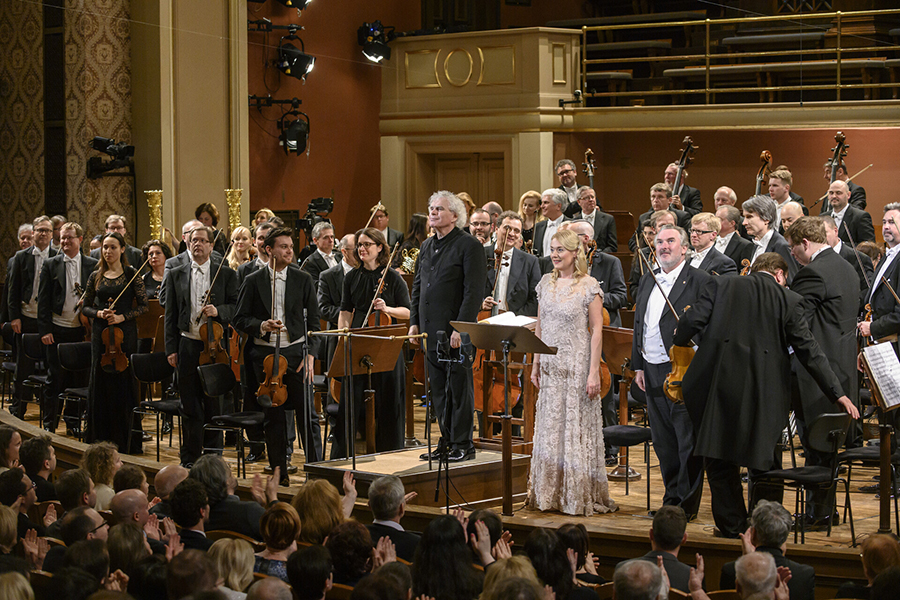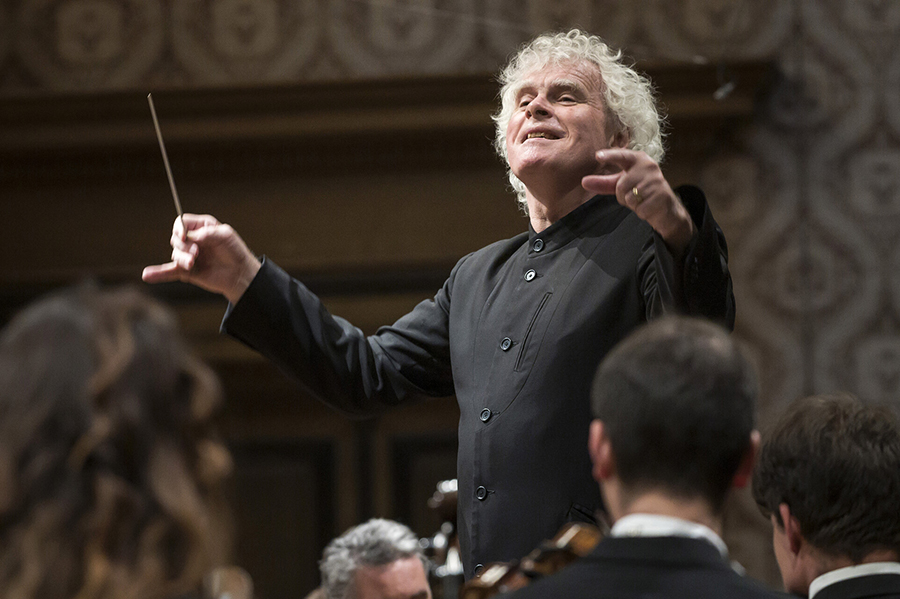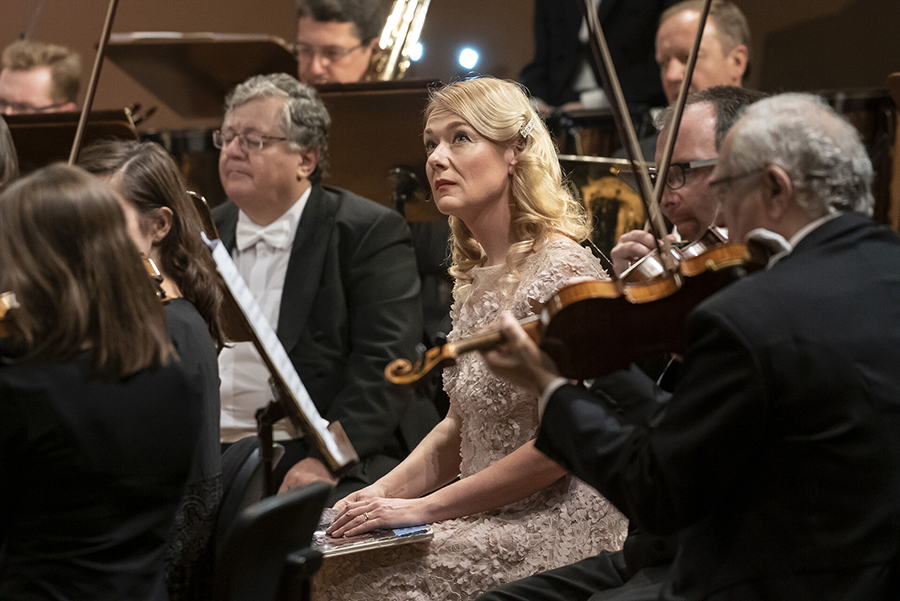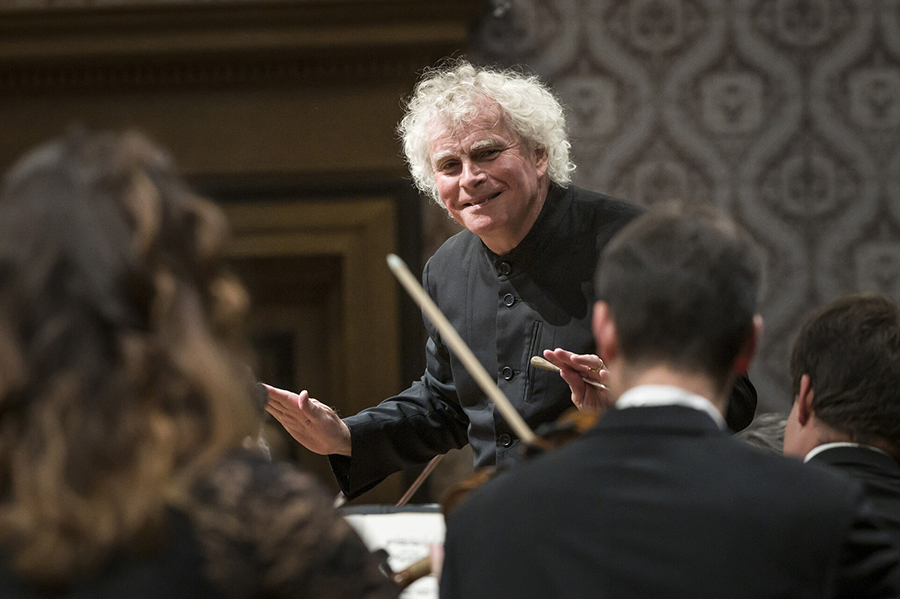The Czech Philharmonic (Music Director Semyon Bychkov) celebrates the anniversary of The Velvet Revolution this year with a series of concerts led by Sir Simon Rattle. The guest artist is Czech mezzo-soprano Magdalena Kožená, and the programme features Ravel’s Five Greek Folk Songs, Béla Bartók’s Five Hungarian Folk Songs and Gustav Mahler’s Symphony No 9.
The 1989 Velvet Revolution which took place in November and December in what was then Czechoslovakia, was a non-violent nationwide protest movement which ended more than 40 years of communist rule in the country. The Velvet Revolution Concerts by the Czech Philharmonic take place to celebrate this revolution each year.
Sir Simon Rattle, recipient of numerous international awards for his recordings, and with longstanding relationships with the world’s leading orchestras and opera houses, is currently Music Director of the London Symphony Orchestra. He is also Founding Patron of the Birmingham Contemporary Music Group and has been a Principal Artist of the Orchestra of the Age of Enlightenment since the early 1990s. Having served as Principal Guest Conductor of the Rotterdam and Los Angeles philharmonic orchestras, and Principal Conductor and Artistic Advisor of the City of Birmingham Symphony Orchestra, he became Music Director of the CBSO before taking up the role of Chief Conductor and Artistic Director of the Berlin Philharmonic Orchestra. As of the 2023/2024 season, Maestro Rattle will become Conductor Emeritus of the LSO, as he becomes Chief Conductor of the Symphonieorchester des Bayerischen Rundfunks in Munich.
The 2022-23 season sees Maestro Rattle leading both of these orchestras, as well as the Staatskapelle Berlin and the Berlin Philharmonic Orchestra, before returning to the Deutsche Staatsoper Berlin to revive Mozart’s Idomeneo. Next summer, he will appear at the Aix en Provence Festival with the LSO, where they will perform Alban Berg’s Wozzeck. They will also tour Japan and South Korea, and later in the season embark on a tour to Australia.
Award-winning mezzo-soprano Magdalena Kožená – who, according to the Irish Times “…. is one of those performers who makes singing seem like an entirely natural activity” – has worked with the some of the world’s leading conductors, as well as with distinguished recital partners. Most recently she has appeared with the Venice Baroque Orchestra in a concert tour of South America, and in other engagements this season Ms Kožená revives the role of Varvara in Janacek’s Káťa Kabanová in concert with the London Symphony Orchestra, and she returns to Mozartwoche Salzburg in a semi-staged performance of Don Giovanni.
On the opera stage, Magdalena returns to the Deutsche Staatsoper Berlin as Idamante in Mozart’s Idomeneo, and makes her operatic debut at Gran Teatro del Liceu as Ottavia in Monteverdi’s Poppea. She also makes her much anticipated role debut in Handel’s Alcina with Les Musiciens du Louvre in a tour to Paris, Hamburg, Madrid, Barcelona and Valencia.
This Czech Philharmonic programme opens with Five Greek Folk Songs by the French composer, Maurice Ravel. These were taken from eight songs for voice and piano which he composed between 1904 and 1906 for his friend, the Greco-French music critic Michel-Dimitri Calvorcoressi who had translated the texts from the island of Chios into French, and wanted them to illustrate a lecture. Ravel selected five of these songs for publication as a cycle with piano accompaniment, and didn’t get round to orchestrating them until 1930. By this time, he was in poor health and completed only two of the orchestrations. The other three were orchestrated by his pupil, Manuel Rosenthal, and the songs with orchestral accompaniment appeared in print in 1935, two years before Ravel’s death.
The Five Greek Folk Songs are followed by Béla Bartók’s Five Hungarian Folk Songs. Bartók spent much of his career collecting and arranging folk songs – not only did he want preserve them, but they also provided inspiration for his own compositions. In 1905 he went travelling in Hungary with his colleague Zoltán Kodály, acquiring a number of songs, and gradually spreading his net wider to include Slovak and Romanian songs, as well as music from Arabia, Turkey and Ukraine. He ultimately became a world authority on the subject, and delivered lectures on the influence of folk music on modern composition as well. In the early 1930s he selected five Hungarian songs from his collection, and on commission from the Budapest Philharmonic, orchestrated them for the celebration in 1933 of the 80th anniversary of the orchestra’s founding.
The final work in this series of concerts is Gustav Mahler’s Symphony No 9 in D major, his last complete work. Although he was by this time based in New York, having become chief conductor of the Metropolitan Opera and also of the New York Philharmonic, he really only felt at home in Austria. He rented an isolated house near the Tyrolean village of Toblach, and started work on his Ninth Symphony during the summer months of 1909, completing the score by April 1910. Mahler didn’t live to see the premiere of this work, which took place on 26th June, 1912, the year after his death. The Vienna Philharmonic was led by Bruno Walter in the Great Hall of Vienna’s Musikverein. The Prague premiere was given on 6th November, 1918, by the Czech Philharmonic, conducted by Otakar Ostrčil, who was a devoted interpreter of Mahler’s legacy.
Sir Simon Rattle is charmingly complementary about the Czech Philharmonic. “It isn’t often that I fall in love with an orchestra, ……” he says. “But when I conducted the Czech Philharmonic for the first time, the kind of music I would like to hear the orchestra play occurred to me immediately. It has been able to preserve its own typical sound, which is perfectly suited to Mahler.”
Maestro Rattle leads the Czech Philharmonic and guest artist Magdalena Kožená in a series of programmes celebrating the anniversary of The Velvet Revolution from 16th to 25th November, in the Dvořák Hall, Rudolfinum in Prague. More information can be found on the Czech Philharmonic website.
All photograpy © Petra Hajska
Information sourced from:
Czech Philharmonic programme notes
Sir Simon Rattle
Magdalena Kožená





